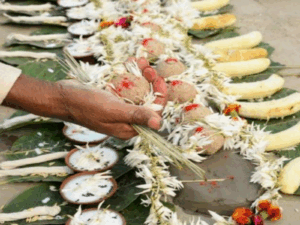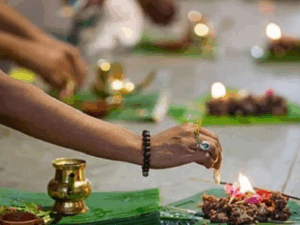Now Reading: Importance of Pitru Tarpan
-
01
Importance of Pitru Tarpan
Importance of Pitru Tarpan

Importance of Pitru Tarpan – Honoring Our Ancestors
Introduction:
In India, the spiritual tradition is that remembering and honouring one’s ancestors is not merely a ritual but a sacred duty. Pitru Tarpan—also Pitratarpan—is a Vedic rite performed by Hindus thanking and seeking blessings from the departed souls. The tying of this ancient practice creates the bridge that connects generations and strengthens family ties while granting peace to the departed.
At Shradhanjali.com, we are aware of the immense sentiment involved in remembering a loved one. Therefore, we provide a truly meaningful platform through digital memorials and information that honours and upholds traditional values.
What is Pitru Tarpan?
Pitru Tarpan, or Pitru Tarpaṇ, is a ritual offering to ancestors, or “Pitrs,” usually involving water, sesame seeds, barley, and sacred mantras. The term Tarpan means please or satisfy, and within this context, it denotes the satisfaction of the souls of the ancestors, who will then bestow well-being on the lineage.
Usually done during the Pitru Paksha or the Shradh time, a period of remembering for 16 days the deceased souls, one performing this ritual tries to put on record gratitude through words and deeds, truly acknowledging the efforts of the forefathers.
Why is Pitru Tarpan Important?
A. Spiritual Significance
Hindus believe that life goes on after death, while souls visit the ancestral world (Pitruloka) until properly appeased.
Performing Tarpan will ensure that ancestors are put to rest and continue their further ascending journey.
These also clear Pitru Dosha, a spiritual problem caused by discontented ancestral souls.
B. Cultural and Family Values
Maintain family traditions and bind each generation to others.
Recall the lives and sacrifices made by our ancestors.
Enforces reverence for living and deceased elders.
C. Karma and Blessings
Pitrs are believed to bless the family with joy, health, wealth, and spiritual prosperity if satisfied.
The Spiritual Science Behind Tarpan
Tarpan is an offering that has been extensively covered in the Vedic scriptures. The elements used—til (sesame seeds), kush grass, and holy water—are all symbolic links that connect the living to the dead.
The divine energy powers the mantras chanted in Tarpan, facilitating the communication between worlds.
The purification process pertains to the performer and purifies the lineage, cancelling karmic debts.
When Should Pitru Tarpan Be Performed?
A. During Pitru Paksha (Shradh Period)
The 16-day period generally falls in September-October (Bhadrapada or Ashwin months).
The period ends on Mahalaya Amavasya, considered to be the most auspicious day for performing all ancestral rites.
B. Monthly on Amavasya (New Moon)
Many people conduct Tarpan every month on Amavasya for uninterrupted benevolence.
C. Special Occasions
On death anniversaries (Shradh Tithi), during solar/lunar eclipses, or while doing Gaya Tarpan (at Gaya, Bihar—considered a sacred site).
Who Should Perform Pitru Tarpan?
Traditionally, the eldest son or male descendant performed the Tarpan ceremony.
In the present day, however, daughters, relatives, and other close family members can also offer Tarpan even if there are no sons in the family.


It can be done earnestly, with dedication and pure intentions.
Step-by-Step Process of Pitru Tarpan
Get rid of impurities: Purification consists of taking a ritual bath and wearing clean clothes.
Intent: Tarpan will be performed in the name of his ancestors as a sankalp.
Ritual Invocation: Offerings made while chanting the names of departed souls.
Offerings: Water and til, kush grass, and rice are brought as offerings.
Prayer and Mantras: Such recitations of Vedic chants as “Om Namo Narayanaya” and Tarpan Mantras are attached.
Conclusion: Honoring the Eternal Bond
Pitru Tarpan is more than just a ritual—it’s a bridge between generations. It keeps alive the sacred memory of those who came before us and guides our future with their blessings. Performing this act not only purifies your karma but also uplifts the souls of the ancestors, bringing them peace and salvation.
By integrating this sacred tradition into your life, you contribute to a cycle of respect, gratitude, and spiritual well-being. Let us carry this heritage forward with faith and devotion.






